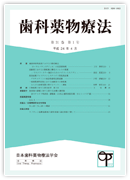
- Issue 2 Pages 69-
- Issue 1 Pages 1-
- |<
- <
- 1
- >
- >|
-
MAYUMI UENO, KAZUHITO SATOMURA2023Volume 42Issue 2 Pages 69-74
Published: 2023
Released on J-STAGE: December 12, 2023
JOURNAL FREE ACCESSIn Japan, the increasing trend of delayed marriage and inclusion of infertility treatments into insurance coverage have led to a significant need to develop comprehensive treatment plans which incorporate dental interventions commencing prior to the initiation of infertility treatments. This study is aimed to highlight a holistic approach taking into account the various stages of pregnancy, childbirth, and childcare, and the evolving health status of patients while planning infertility treatment procedures, by establishing an effective interdisciplinary collaboration between medical and dental practitioners. We believe that our study makes a significant contribution to the literature because in the prevalence of the COVID-19 pandemic, individuals undergoing fertility treatments, pregnant and lactating women exhibit a notable propensity for heightened anxieties, including substantial concerns regarding oral health-related problems and dental procedures, which need to be addressed thoroughly.
Further, we believe that this paper will be of interest to the readership of your journal because our study findings will benefit the patients and doctors alike in devising effective treatment protocols for successful outcomes.
View full abstractDownload PDF (1479K)
-
NAOHIRO YABUKI, ATSUSHI ISHIMURA2023Volume 42Issue 2 Pages 75-78
Published: 2023
Released on J-STAGE: December 12, 2023
JOURNAL FREE ACCESSIn recent years, antimicrobial resistance (AMR) has become a health problem worldwide. In Japan, the Ministry of Health, Labour and Welfare (MHLW) has presented an action plan for AMR countermeasures. Although the standard duration of antimicrobial therapy for dental infections has been shown to vary depending on type of infection and patient's condition, three-day therapy is considered the basic duration. Inappropriate or prolonged administration of antimicrobial agents results in the emergence of drug-resistant bacteria. Particularly, prolonged use of empiric antimicrobial agents may lead to the emergence of drug-resistant bacteria. Therefore, in this study, we evaluated the use and duration of antimicrobial administration in dental practice. The results showed that more than 80 % of prescriptions were for 3 days or less, with a decreasing trend in the number of prescriptions of cephalosporins, (particularly, the third-generation. In addition, there were an increasing number of prescriptions of penicillins. However, since the reduction rate of cephalosporins has not reached that reduction rate set forth in the Action Plan for AMR control, the hospital Infection Control Team (ICT) and Antimicrobial Stewardship Team (AST), which are currently expected to carry out few interventions in dental practice, should significantly limit antimicrobial use and ensure the use of first-line drugs for treatment. The significance of these interventions in the dental field could be effective.
View full abstractDownload PDF (1460K)
-
2023Volume 42Issue 2 Pages 79-81
Published: 2023
Released on J-STAGE: December 12, 2023
JOURNAL FREE ACCESSDownload PDF (2042K)
-
[in Japanese]2023Volume 42Issue 2 Pages 83-87
Published: 2023
Released on J-STAGE: December 12, 2023
JOURNAL FREE ACCESSDownload PDF (1180K)
- |<
- <
- 1
- >
- >|